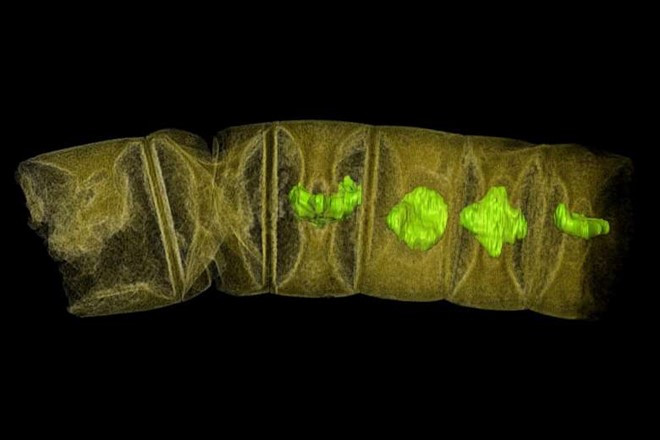The 1.6 billion year fossil shook the theory of life on Earth
Two red algae-like fossils are believed to be the oldest plant fossils ever found on Earth, shattering the hypothesis of life history on the green planet.
According to research published March 14 in the journal PLOS Biology, these fossils are found in sedimentary rocks at Chitrakoot, central India.
A slender fossil, the other specimen has a thicker and more complex structure. They date to 1.6 billion years, still intact, to help scientists study the complex structure of primitive algae.
In the cells of these fossils, scientists found chloroplasts, which play an important role in the photosynthesis of plants.
"The fossil DNA is no longer available but based on its morphology and structure, it is presumably a red algae , " said Stefan Bengtson, professor of paleontology at the Swedish Museum of Natural History. .

Photos of red algae X-ray fossils.(Photo: Reuters).
Red algae are primitive plants that exist today and thrive in marine environments (can be found in coral reefs) or in freshwater environments. The red algae, called Nori, is a popular sushi ingredient.
"We were able to eat sushi from 1.6 billion years ago," Reuters quoted biologist Therese Sallstedt at the Swedish Museum of Natural History.
New evidence suggests that multicellular organisms seem to begin to evolve earlier than humans have thought of 400 million years. Because before that, the oldest red algae fossil was found only in 1.2 billion years.
Bengtson believes that the occurrence of these fossils may cause experts to review the hypothesis of life history on Earth.
"Perhaps living entities visible to the naked eye (made up of multicellular organisms), have appeared on Earth earlier than we thought," Professor Bengtson said.

Red algae-like fossils are found in sedimentary rocks in India.(Photo: Daily Mail).
The earliest trace of life on Earth appears to be around 3.5 billion years ago but exists as a single-celled organism.
About 600 million years later, new organisms appeared. The emergence of protoplasms has a great influence on the evolution of complex organisms including plants and animals.
- The first sign of life on Earth could be bacteria
- Detection of 2.5-billion-year-old fossil microbes live without oxygen
- Evidence of 4 billion years of life on Earth is discovered
- Life began on Earth 3 billion years ago
- Life on Earth can come from the universe
- The oldest fossil on Earth
- The 3.7-billion-year-old fossil signals life on Mars
- Life migrates from the earth
- How long will life on Earth exist?
- Life on Earth will be destroyed after 3 billion years
- Discover the most important fossil in Canada's paleontological background
- Life on Earth may have started over 4 billion years ago
 Discovered an ancient centipede fossil 99 million years old
Discovered an ancient centipede fossil 99 million years old Discovered bat-like dinosaurs in China
Discovered bat-like dinosaurs in China Discovered a 200-year-old bronze cannon of the coast
Discovered a 200-year-old bronze cannon of the coast Discover 305 million-year-old spider fossils
Discover 305 million-year-old spider fossils